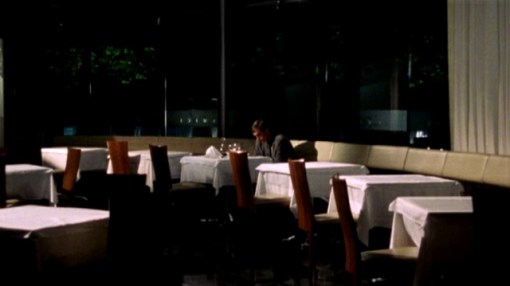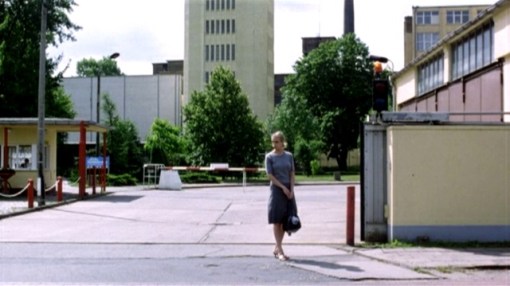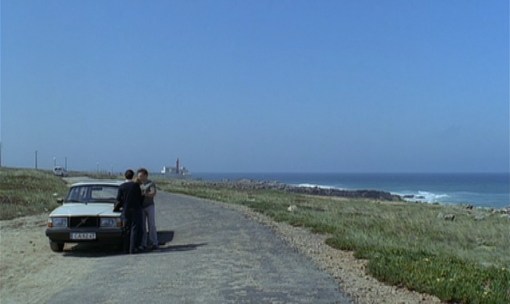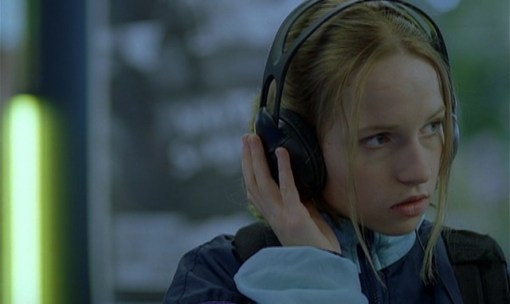After the rare misfire in Cuba Libre, Petzold is back on track with his usual concerns in The Sex Thief. In all honesty, this feels like his own personal attempt at refining what he accomplished in his debut, Pilots. The story is remarkably similar: two women fighting back against an exploitative labor relationship, framed through the ever-watchful eye of state surveillance. In that earlier film, Petzold’s brevity made his story hit harder. Here, I guess his characters are fleshed out, but I’m not sure that’s exactly a good thing for a Petzold film. As it stands, I think he runs out of steam early. In a way, it makes sense that he had to make Cuba Libre and this after Pilots before he could achieve The State I Am In. Somewhere during this made for television period he found a way to let his camera linger in a way that artfully plays up the tensions in personal relationships without making them resolutely clear. As it is, he is still working through some aesthetic growing pains in this film.
The film opens with our protagonist, Petra, in the embrace of who we presume to be her lover. A bucket of water is quickly thrown on this fire when Petzold cuts directly to Petra robbing this man in his sleep. This, we soon learn, is her profession. Petra makes her money by seducing, drugging, and robbing men. To her, the cause is noble, as she is doing this to finance the education of her younger sister, Franziska. After a close call with a undercover cop, Petra gives herself a break and visits Franziska. She keeps her profession a secret from her sister, telling her that she’s a successful manager. The sisters are telling lies to each other, as Franziska is not furthering her education but working in retail. Upon this discovery, Petra makes it her mission to assist Franziska in finding a job that fits her credentials.
There’s a somewhat recent interview with Petzold in which he is asked about the “transient spaces” depicted throughout his work. He responds by relaying a description of an extended stay in London’s Heathrow Airport. To quote him, “this is a shit place in the world, but it’s filled with images of waterfalls and beautiful women and advertising for wellness. Yet nothing is happening—you’re dying there. Capitalism makes all of the world the same. It tells you that just around the corner there’s an adventure, but there’s nothing.” It’s a telling description because Petzold often perfects this “airport feeling.” In The Sex Thief, Petra spends all of her time in hotels, which she uses as her justification for visiting her sister’s loft. “I work for hotels, I live in hotels, I eat in hotels. I wanted to be somewhere far away from that.” What she seeks is a lifestyle rooted, a routine, and a foundation. She tries to accomplish this with her sister, helping her acquire stable employment, but she helps her by using what she knows, which yields little success.
Petra’s coaching of her sister is sensual and precise, and Petzold’s depiction of it is something that manages to channel both De Palma’s lasciviousness and the otherworldly detachment of late Bresson. I’ve never considered either of these filmmakers in analyzing Petzold but I find it informative, if one applies the comparison with some caution. Bresson is perhaps the urtext to a certain kind of Western European Minimalism of which Petzold, at least in his early days, is undoubtedly a disciple. Meanwhile his fondness for Hitchcock is well-documented, and he does participate in the sort of narrative slight-of-hand that informs all of De Palma’s work. This is the Petzold film that is most specifically about eros, yet it also feels the least sensual of all his work. Perhaps it is that incomparable tension that he slowly builds that can make a film like Gespenster feel uncomfortable and sexy at the same time. Here, romance is a labor-performance, stripped (pardon the pun) of its nervous (and exciting) energies. It’s a cynical view, but it isn’t unearned.
Unfortunately, the cynicism of The Sex Thief isn’t balanced by the humor like it is in Pilots. Fittingly, there’s a laborious sensation felt in watching a film that, despite its many insights offered by a brilliant filmmaker who is just beginning to come into his own, is something of a retread of an earlier film. It’s a form of homework I don’t mind completing mind you, and there are moments of unique brilliance. When Franziska goes in for a job interview, the back and forth between her and her potential employer is filmed. Her seduction doesn’t work, which makes Petra seek the interviewer out. She seduces him and takes him back to his apartment, where he is all too eager to show her footage of the day’s interviews. There, he pinpoints the errors in Franziska’s seduction. The sequence quickly synthesizes Petzold’s chief interests, which are made literal. It’s an austerely observed sequence of labor, sex, and surveillance all interacting at once. One can’t fault him for being too on the nose in this film, because it feels like a necessary exercise on the way to making The State I Am In, his masterpiece.




























